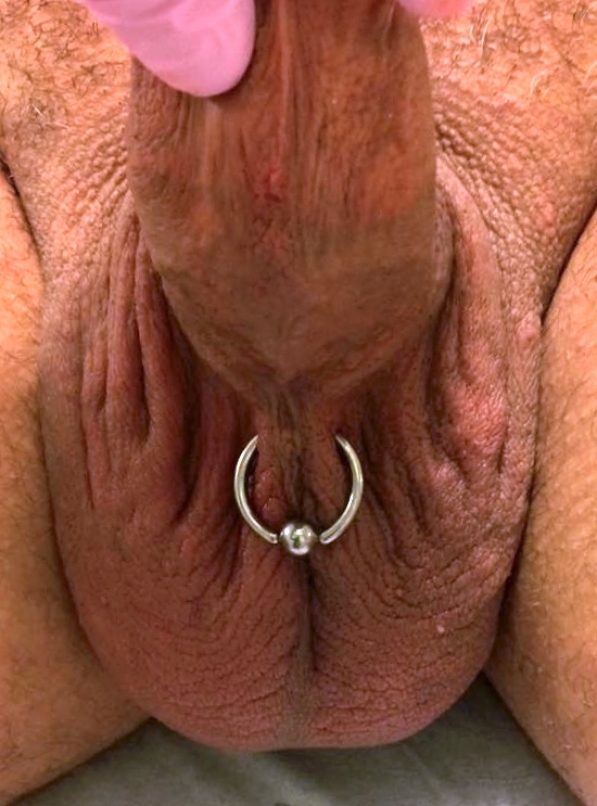
The lorum piercing is located at the natural dividing line between the penis shaft and the scrotal sac. The name was coined in the 1980s while I was performing a genital piercing on the late Dan Kopka, my coworker at the time, at Gauntlet in Los Angeles. He wanted a frenum, he said, only lower.
“Not a frenum, a lower-um,” Dan declared, pinching the tissue at the desired location.
“Oh, that would be a good spot. Yeah, a ‘lorum,’” was my reply, and thus it was named. That particular piercing has been called a lorum ever since.
General Information
A lorum is a close relative of the frenum piercing. Yet also similar to a scrotum piercing--it is situated at the spot in between the two.
The tissue is extremely stretchy and varies considerably depending on the weather and arousal, among other factors. If placed too close to the surface with too small a ring it has a tendency to migrate out. I see this error frequently made by piercers with insufficient training and/or experience.
Placement
The lorum is a horizontal piercing on the underside of the penis at the natural juncture of the penis and the scrotum. Because of the variable and stretchy nature of this tissue, it is important to carefully check the spacing of proposed marks before piercing you. The skin can expand dramatically as you warm up.
Also, in the erect state, the tissue in this area rises upward toward the shaft, and this should be taken into account during marking to make certain it ends up where you want it to be. There isn't a "right" or "wrong" option for this; it is simply a personal preference matter.
So it can be cheated slightly toward the shaft for functionality: in this spot, the jewelry helps to anchor a condom in place—though this could be traumatic during healing, and uncomfortable as well.
Or, the lorum could be seated slightly south, toward the scrotum, so that it is not at the base of the erect penis. There's nothing wrong with a piercing lower than that, but it would simply be called a scrotum piercing, rather than a lorum.
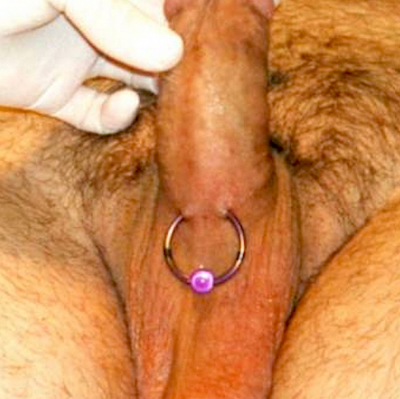
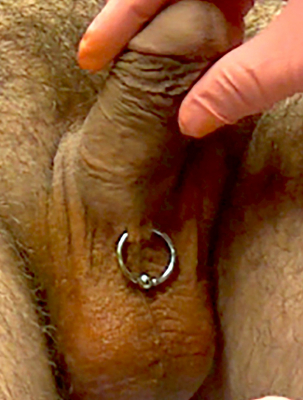
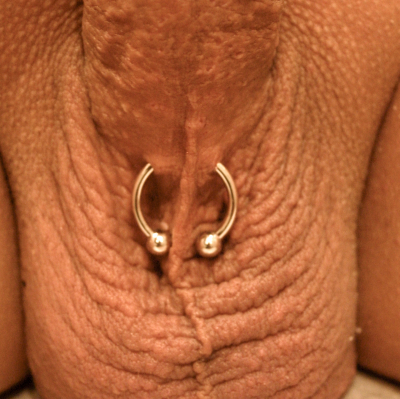
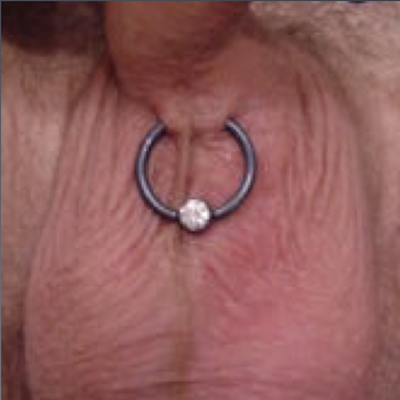
Jewelry
The lorum should be started with jewelry in a fairly sizable diameter: a 3/4", or even 7/8", depending on build. I'll will use 12 gauge as the minimum thickness for a lorum piercing, but more commonly I pierce with 10 gauge.
It can be started with ring-style jewelry or a curved bar, and even a straight bar, though I'm less likely to use the latter as I find curved jewelry generally conforms better to this area.
Once you are healed, it is not particularly difficult to change your jewelry. A minor challenge is that your penis needs to be kept out of the way in order to access the area.
Much like a frenum loop, a large ring can be worn around the shaft at base of the penis through the healed piercing. To make an even more effective pierced cock ring arrangement, wear this in conjunction with a pubic piercing and thread a single ring through both healed channels. Accurate placement is imperative for this to be workable; even so, it can be uncomfortable for daily wear. If you have a large size differential between flaccid and erect states, this combination will not be feasible.
The lorum is a sturdy piercing that can be stretched to large gauges. It is not particularly challenging to enlarge, but you must have sufficient tissue in the initial piercing and wait long enough (six months or more) between stretches.
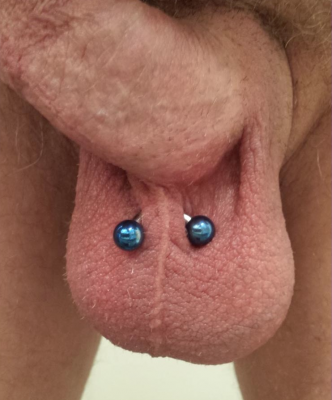
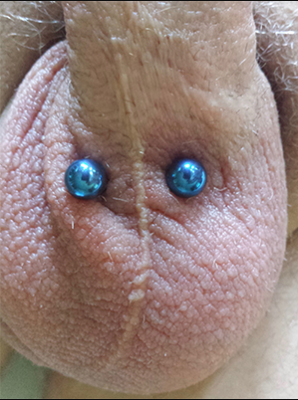
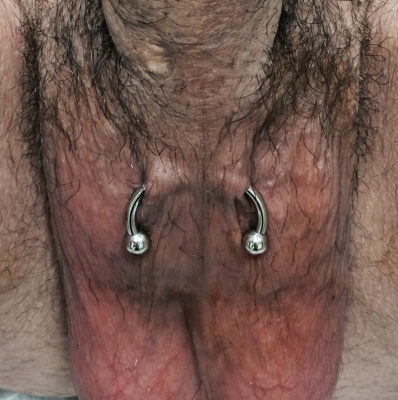
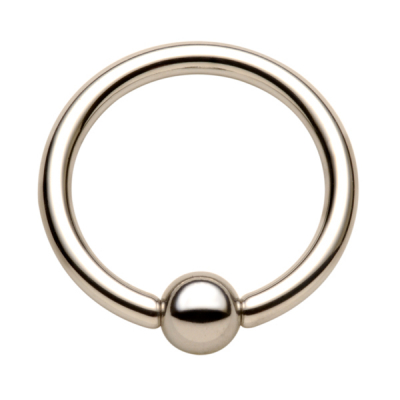
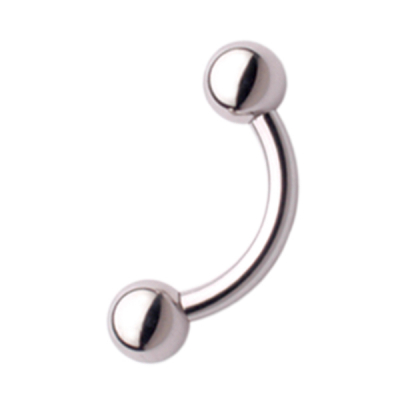
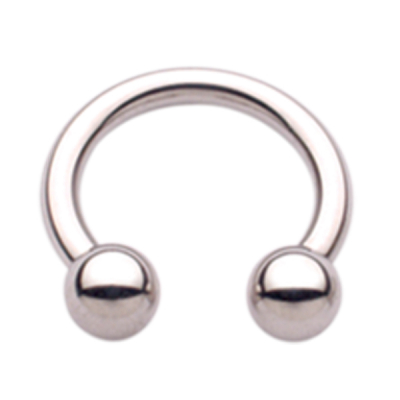
Procedure
I perform the lorum with forceps, as I do other piercings in this area. Your piercer may request that you wash your hands or don a glove to help hold your penis out of the way. Some piercers will make use of a Prince Albert piercing, if you have one, by attaching a cord to your jewelry and tying it around your neck to keep your penis from obstructing the area. Your piercer may, however, manage to access the area without assistance.
If you have failed to trim or shave, the pulling of some hair may end up being the most uncomfortable part of your piercing experience; men do not usually find the lorum to be an intense piercing. This area seldom bleeds heavily.
Learn which piercing(s) you are built for?
Healing and Troubleshooting
The piercing is protected because it is sandwiched between the scrotum and the shaft of the penis. Therefore, healing tends to be easy and comfortable when compared with piercings on the scrotum that are more exposed. Like other genital piercings, this one sometimes develops lumpy or hardened tissue around the jewelry as a normal part of healing.
Because the lorum rests just inside the open end of a condom, during healing a waterproof bandage must be used to seal off and protect your piercing and the surrounding area before sexual activities.
The lorum pictured below is through too little tissue and the jewelry should be removed before further migration or total rejection occurs. I didn't do the piercing so I'm unsure whether it was started too shallow, or migrated to this position. The balls on the jewelry are oversized and too heavy for the amount of pierced skin, and this may have contributed to the problem.
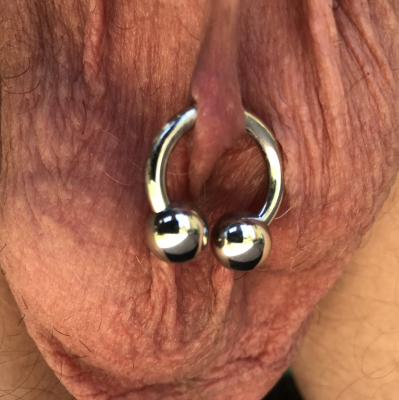
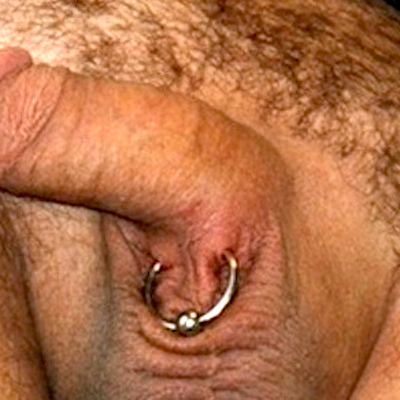
What My Happy Clients Say
I've been lucky enough to get a guiche and lorum piercing by Elayne on her last visit to Philly. No matter how long the wait is for an appointment with Elayne, it's WELL WORTH the wait! She is very professional and the best in the business in my opinion.
I'm glad to see that you're coming back and will be signing up for more genital piercings.
I had a very great time getting to meet and get pierced by Elayne! I got one of her own creations the Lorum and it's fantastic, I love it!
Thank you very much for the great experience Elayne, I can't wait to get another piercing from you.
I got an Apadravya along with a Pubic and a Lorum. My appointment with Elayne was simply awesome.
The actual piercings were over in an instant. Didn't hurt nearly as much as I had been fearing.
I can't say enough nice things about this experience. I shared a moment with Elayne and got exactly the piercings I wanted. I could not be happier with them.
